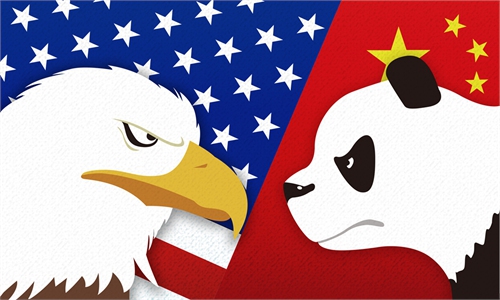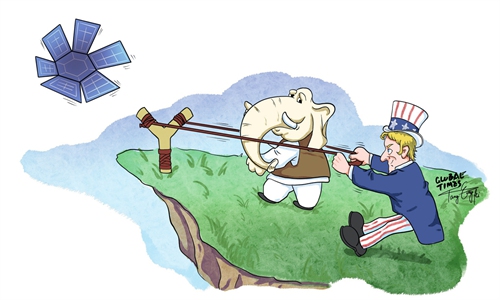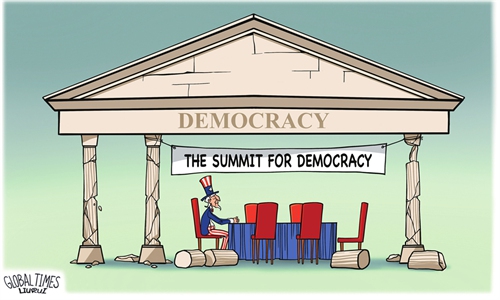
A view of Havana, capital of Cuba, after six decades of economic sanctions by the US. Photo: Xinhua
Editor's Note:
How many evils have been committed in the name of democracy?
Exporting wars, launching "color revolutions," fomenting extremist ideologies, and promoting economic instability... the US has left endless trails of bloodshed and turmoil around the world. While the "model of democracy" loses its shine, the US still attempts to establish exclusive cliques through the so-called democracy summit. To expose the nature of "American democracy," the Global Times is publishing a series of articles to unmask the US' four democratic hegemonic sins.
This is the final piece in the series. The previous ones are: US war-mongering under guise of 'democracy' inflicts untold damage on the world; US wages global color revolutions to topple govts for the sake of American control; US cultivates pseudo-religious groups overseas, pumps support to terrorists to wreck its adversaries.
Coercion against other countries has created the economic power of the US today, and unfortunately, the country, which claims to promote democracy and human rights, continues to use economic means at its disposal to scourge people around the world.
From increasing economic sanctions against so-called hostile countries, to interfering in other countries' internal affairs under the banner of economic aid and abusing extreme measures such as "long-arm jurisdiction" to bully competitors, this series of despicable economic tactics conducted by the US have seriously affected many countries' economies and their people's livelihoods, and even constituted a systematic violation of human rights.
Experts and observers reached by the Global Times said that currently, the US, with its unilateralism and trade protectionism thought, has been wielding the stick of sanctions and tariffs to bully and blackmail the weak around the world.
However, the chaos, turmoil and crises caused by arbitrary sanctions and interference have shattered the false mask of the US. The international community has clearly realized that the US, the so-called "guardian of democracy and human rights," is actually the biggest destroyer of these terms.
Starving the nations
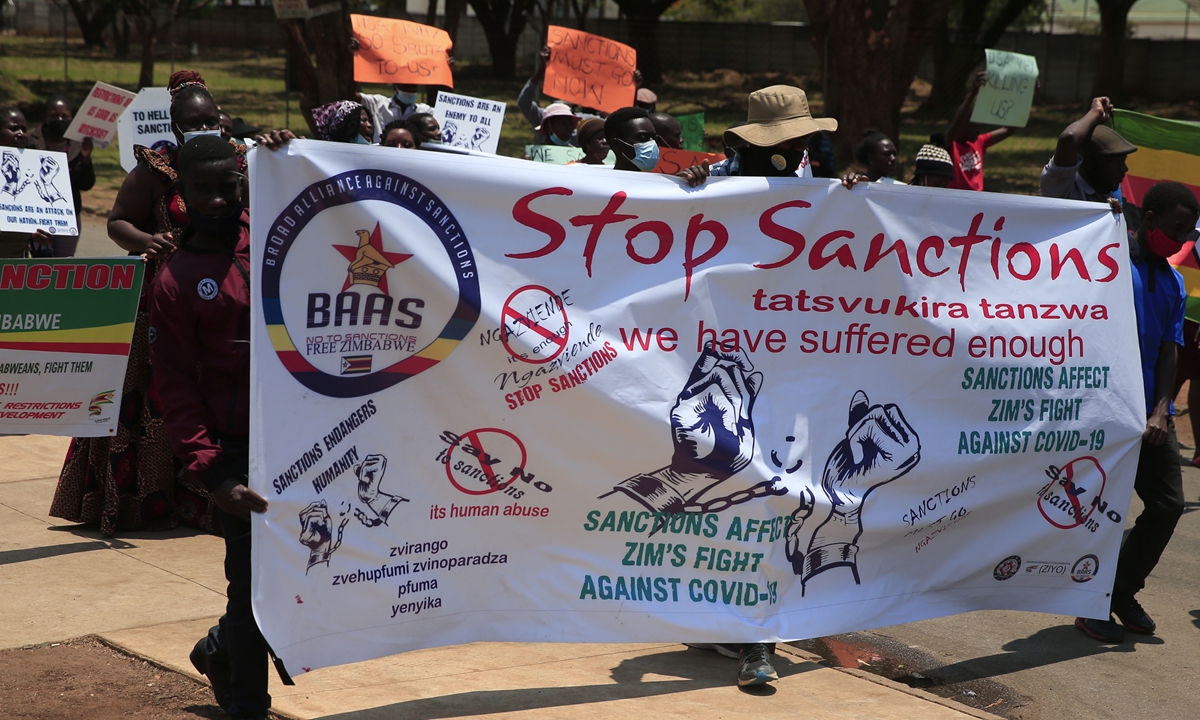
"In Zimbabwe, people don't agree with the bullying practices being carried out by the United States... Let Zimbabwe adopt American democracy, whether for the sake of it. Nobody's interests will work," said Sally Ngoni, spokesperson for the Zimbabwe's Broad Alliance Against Sanctions, the Xinhua News Agency reported.
This outrage in Zimbabwe began in 2000. When the Zimbabwean government introduced land reforms that nationalized land that had long been in the hands of white farmers and distributed it to landless local natives, the US and other Western countries ended all economic aid to Zimbabwe and began imposing sanctions on it. The US Senate passed the "Zimbabwe Democracy Act of 2000" to "legitimize" the US government's support for Zimbabwe opposition in the US and then listed Zimbabwe as one of the six "outposts of tyranny" in the world in January 2005.
According to Zimbabwean newspaper the Herald, the illegal economic sanctions since 2002 have caused losses to the Zimbabwean economy to surge to $100 billion, with borrowing costs up more than 1,000 percent higher than the average for most countries.
On October 28, the United Nations special rapporteur on the negative impact of unilateral coercive measures on human rights Alena Duhan, noted that these sanctions have had a devastating impact on the country's economy especially during the COVID-19 outbreak. The sanctions prevented the Zimbabwean government from obtaining adequate medical supplies, which adversely affected the country's fight against the epidemic.
The Zimbabwean people's outcry is just one of the countless protests to the economic coercion imposed by the US under the guise of "American democracy."
The US and its allies have repeatedly launched attacks against different countries using economic sanctions and wars, and the number of afflicted countries is staggering, said a recent report titled "Democracy summit, undemocratic practices" in Pakistan's The News International.
According to the 2021 Sanctions Review report released by the US Department of the Treasury in October, the economic and financial sanctions imposed by the US on other countries have seen exponential growth since the September 11 attacks. By the end of fiscal year 2021, the US has imposed sanctions on 9,421 entities and individuals, up 933 percent from 2000.
"Economic sanctions are being applied to get results like a slow poisoning. They compel nations to starve and die bit by bit. In the process they do not care for human lives leave alone human rights, and the rights of women and children," the The News International said.
In December 1950, the US designated North Korea as a hostile state threatening US security, froze North Korea's assets, prohibited trade, investment, financial transactions and transportation with North Korea, and cut off all bilateral economic relations according to Trading With the Enemy Act.
In the 60 years since 1959, when Fidel Castro overthrew the pro-US dictatorship and established a revolutionary government, the US imposed the longest and most severe systemic trade embargo, economic blockade, and financial sanctions in modern history. Both the Cuban government and the United Nations have estimated that the sanctions have cost the Cuban economy $130 billion over the past six decades, Al Jazeera reported.
And since the late 1970s, the US has also been imposing long-term blockades and sanctions on Iran, inflicting $1 trillion in damages to Iran's economy.
During the COVID-19 pandemic, the US has even been engaging in extortion by preventing Iran from buying food, medicine, and vaccines.
During the 46th session of the UN Human Rights Council held in March, human rights experts criticized the US for its long-standing violation of the international law and imposing sanctions on other countries, which have seriously violated a wide range of human rights in Cuba, Haiti, Iran, Syria, Venezuela, Zimbabwe, and other countries around the world.
"The best way to think about the role of sanctions in American foreign policy is to regard it as an addiction," said Nicolai N. Petro, a professor at the University of Rhode Island.
US politicians are addicted to economic sanctions, because they are cheaper than military intervention, making them a cost-effective way for Washington to vent its frustrations and force other countries to comply with its terms, Qi Kai, an expert on international political economy at China University of Political Science and Law, told the Global Times.
"In the process of making such decisions, the US shows its own loss of human rights and democracy. The US clearly knows that it is not dictators who are targeted by economic sanctions, but ordinary people who ultimately suffer, and it still indulges in economic sanctions for its own gain," Qi said.
Pitfalls of 'development'
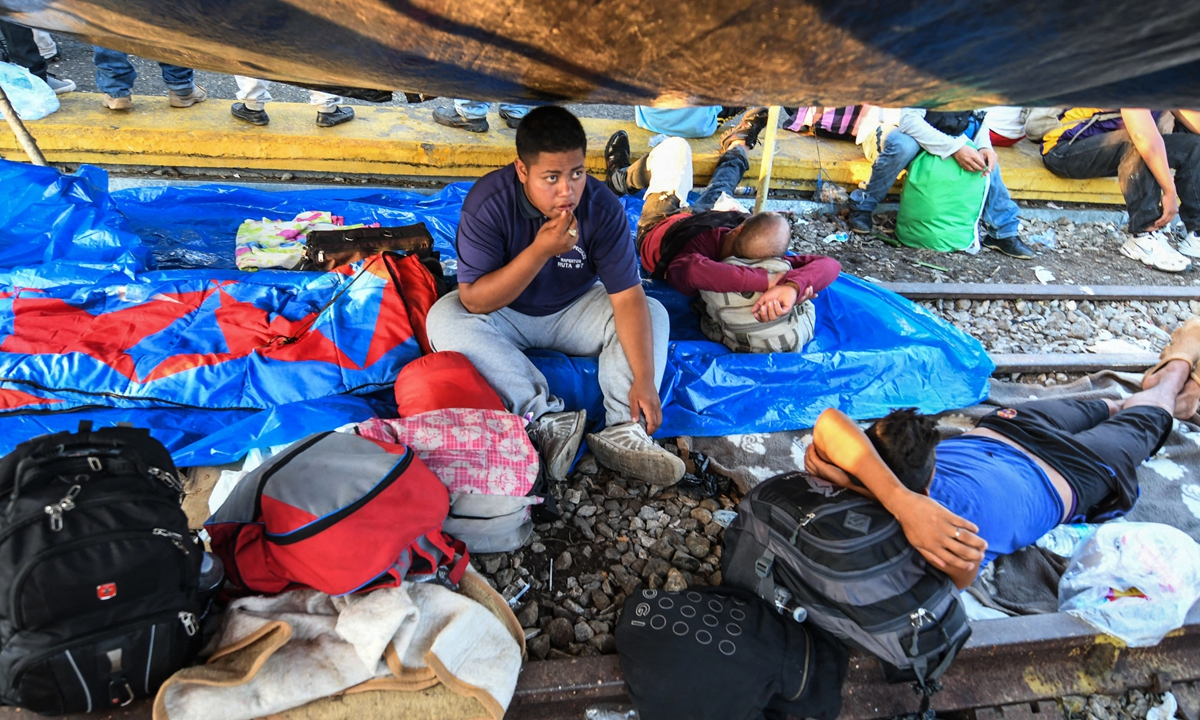
Honduran migrants wait to cross the border from Guatemala to Mexico on October 22, 2018. Photo: AFP
In addition to using economic sanctions to press the thorn in the side of its targets, observers pointed out that for a long time, the US has indulged in the exploitation and control of developing countries under the banner of aid.From the end of the 18th century, in order to court the huge interests in the fruit industry in Central and South America, the US established the United Fruit Company and Standard Fruit Company to carry out capital colonial plunder and monopoly in Panama, Cuba, Honduras, Nicaragua, Colombia, and other countries. Through proposing the unequal economic development model of "railroad for land," the US controlled the economic lifeline of these countries and then gradually intervened in local politics, even establishing puppet regimes, which plunged these countries into long-term turmoil.
In Guatemala, for example, at the height of its US domination, in addition to the banana trade, more than 90 percent of the country's communications and media industries, Atlantic shipping lanes, and more than 70 percent of the country's railway and electricity generation were in the hands of American companies. The US even manipulated the CIA to alter Guatemala's presidential election in 1954, after which more than 200, 000 people died during the three decades of civil war.
Qi noted that these "Banana Republics," referring to the countries that rely on the export of cash crops such as bananas and cocoa for revenue and have been dominated by the US government and entrepreneurs in the past, are vivid examples of how the US manipulates other countries by economic means under the banner of "development" and "democracy" to lure developing countries into pre-determined traps.
At the same time, the US has also long been trying to spread its "democratic" ideology to the world through its large-scale enterprises, expanding national interests and strategy under financial aid pretenses.
For example, the Millennium Challenge Corporation (MCC) is an aid program agency established by the US Congress in 2004 which provides assistance to lower-income countries that can only "qualify" if they "demonstrate a democratic governance." It has been considered violation of the sovereignty of the countries and is resisted against by many countries.
On November 1, 2020, Sri Lankan President Gotabaya Rajapaksa declared that the US' MCC agreement will not be signed under his administration to prevent his country from being threatened in any way, Sri Lankan media reported.
In Africa, the US also tried to follow the modern imperialism exploitative route, but jealousy over the good cooperation between China and African countries saw it starting to sow discord and ultimately concocting the so-called Chinese debt trap theory.
"But the fact is, the vast majority of the world's developing countries have been in debt for so many years, but who do they owe the most money to? Without question, it is the US," Qi said.
Relying on the dollar as an international payment currency and its financial hegemony, the US issued currency based solely on its own economic situation, pillaging foreign exchange reserves through exchange rate fluctuations and grabbing huge profits while transferring the crisis, said Song Guoyou, deputy director of the Center for American Studies at Fudan University.
"Especially after the COVID-19 outbreak, the country has been intensifying its uncapped quantitative easing policy and wildly increased monetary issuance, causing inflation in its own country while also seriously disrupting the domestic economic environment of other countries," Song told the Global Times.
Long-arm jurisdiction
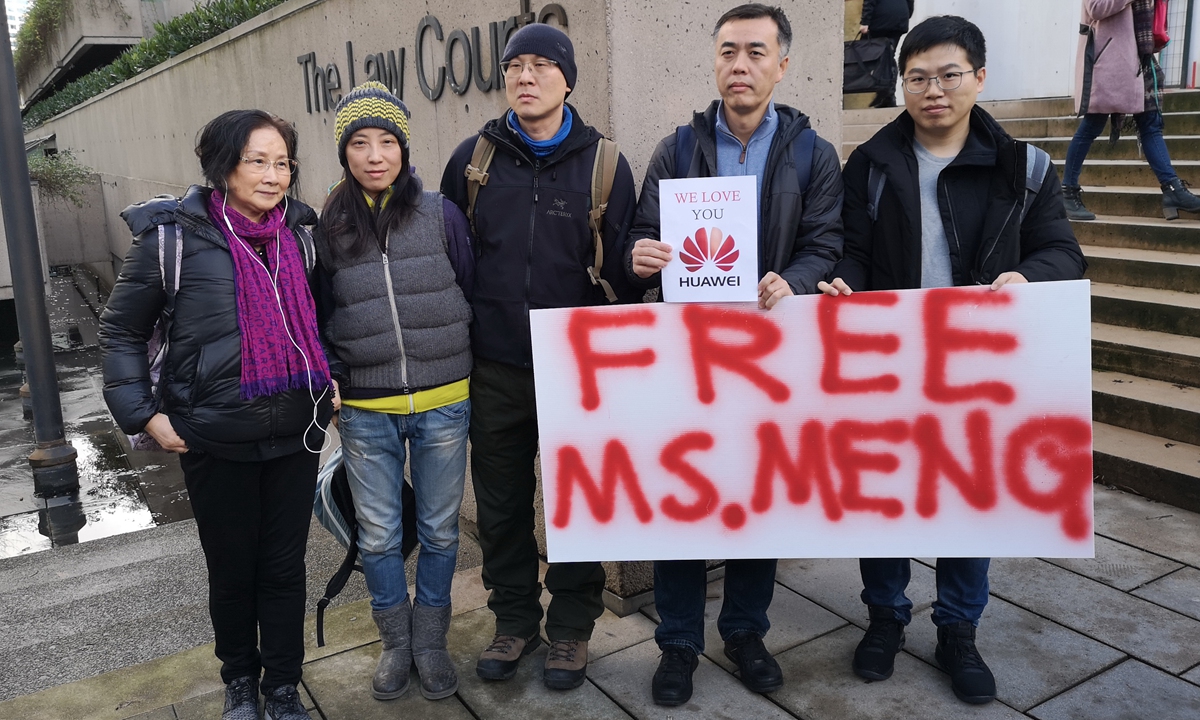
People hold a sign calling for the release of Huawei CFO Meng Wanzhou outside the Supreme Court of British Columbia in Vancouver, Canada, on December 10, 2018. Meng was arbitrarily detained on December 1, 2018 at Vancouver airport and was finally released on September 24, 2021. Photo: IC
On December 2, US Deputy Secretary of State Wendy Sherman and Secretary General of the European External Action Service Stefano Sannino held the second US-EU Dialogue on China, and while issuing a statement reaffirmed the importance of "addressing economic coercion.""China doesn't bully or wantonly sanction others, wield long-arm jurisdiction, or suppress foreign businesses. How can anyone accuse it of coercion? It is well known that coercion is the strong suit and distinct feature of the US," Chinese Foreign Ministry spokesperson Zhao Lijian said during a press conference on December 3, noting that with its policies and actions, the US has provided some textbook examples of economic coercion to the world.
In order to contain China's rise, the US has labeled China as "undemocratic" and "not open" all year round, but it is the US that actually indulges in unilateralism, protectionism, and economic hegemony to retaliate against countries whose trade practices are considered by the US as "unreasonable" and "unfair," experts noted.
In August 2017, the US launched a 301 investigation against China under its own Trade Act of 1974 and then waged a large-scale trade war by imposing 25 percent tariffs on $50 billion worth of imports from China.
Since the signing of the China-US phase one trade agreement in January 2020, the US has continued to take repression and containment measures against China, including placing more than 940 Chinese entities and individuals on various lists of restrictions.
"The US is a thief crying 'stop thief.' Its slander of China is a mapping of the US' own poor performance in the trade arena," Song said.
The US is not just targeting China. Starting in September, in addressing the domestic semiconductor chip shortage, the US government brutally forced Samsung, TSMC, and other companies to hand over their semiconductor inventories and other trade secrets. US Commerce Secretary Gina Raimondo even warned that if companies did not answer the voluntary request, "then we have other tools in our tool box that require them to give us data... if we have to we will," Reuters reported.
For a long time, the profit-seeking US has wantonly oppressed businesses in other countries. Under the pretext of "national security," the US wantonly oppresses foreign companies, denying their market access, exercising "long-arm jurisdiction" to coerce third countries to sever their supply to foreign companies, and even detain foreign enterprises' senior executives, Song said.
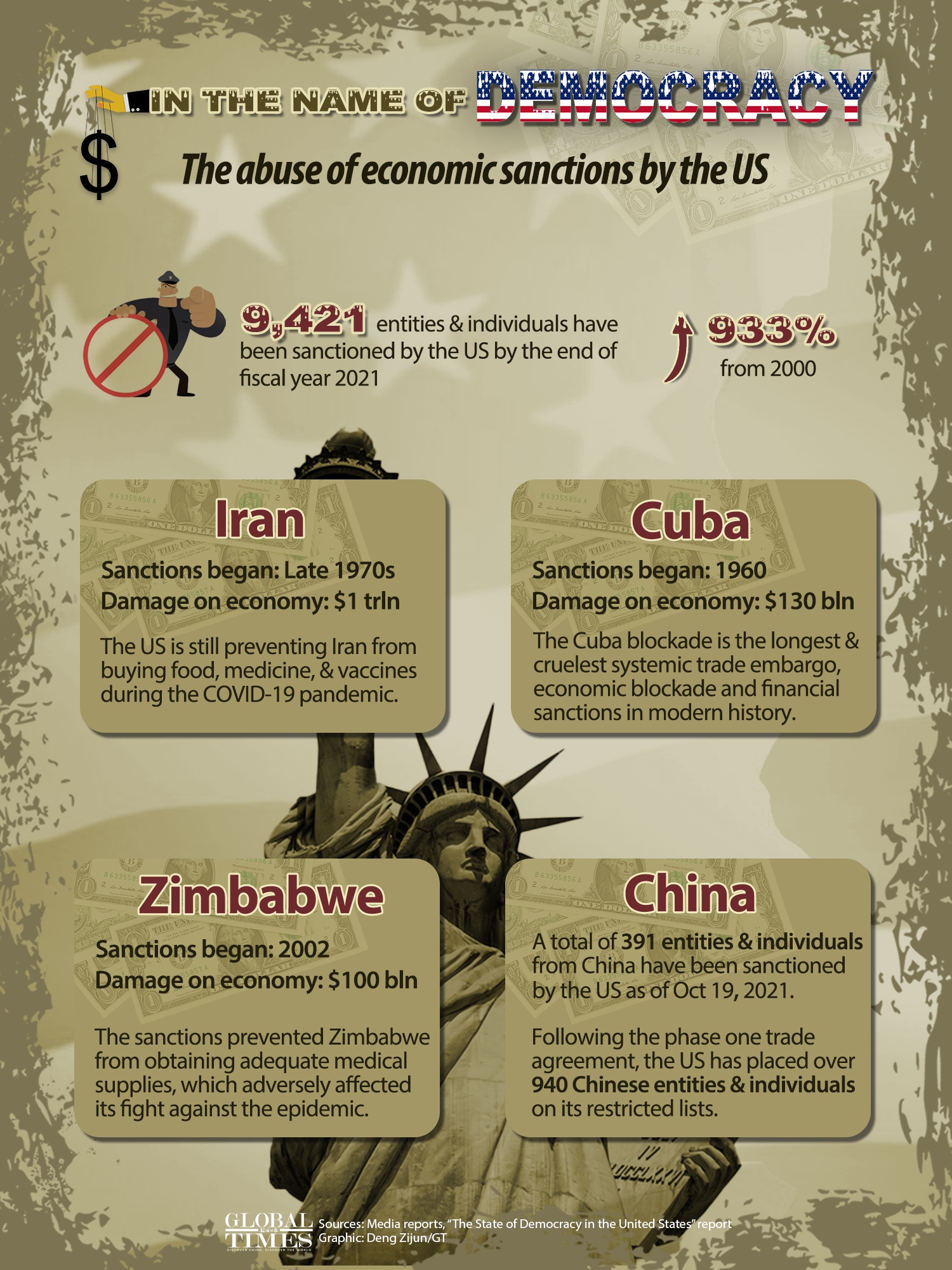
The abuse of economic sanctions by the US.Infographic:Deng Zijun/GT

A view of Havana, capital of Cuba, after six decades of economic sanctions by the US. Photo: Xinhua
Editor's Note:
How many evils have been committed in the name of democracy?
Exporting wars, launching "color revolutions," fomenting extremist ideologies, and promoting economic instability... the US has left endless trails of bloodshed and turmoil around the world. While the "model of democracy" loses its shine, the US still attempts to establish exclusive cliques through the so-called democracy summit. To expose the nature of "American democracy," the Global Times is publishing a series of articles to unmask the US' four democratic hegemonic sins.
This is the final piece in the series. The previous ones are: US war-mongering under guise of 'democracy' inflicts untold damage on the world; US wages global color revolutions to topple govts for the sake of American control; US cultivates pseudo-religious groups overseas, pumps support to terrorists to wreck its adversaries.
Coercion against other countries has created the economic power of the US today, and unfortunately, the country, which claims to promote democracy and human rights, continues to use economic means at its disposal to scourge people around the world.
From increasing economic sanctions against so-called hostile countries, to interfering in other countries' internal affairs under the banner of economic aid and abusing extreme measures such as "long-arm jurisdiction" to bully competitors, this series of despicable economic tactics conducted by the US have seriously affected many countries' economies and their people's livelihoods, and even constituted a systematic violation of human rights.
Experts and observers reached by the Global Times said that currently, the US, with its unilateralism and trade protectionism thought, has been wielding the stick of sanctions and tariffs to bully and blackmail the weak around the world.
However, the chaos, turmoil and crises caused by arbitrary sanctions and interference have shattered the false mask of the US. The international community has clearly realized that the US, the so-called "guardian of democracy and human rights," is actually the biggest destroyer of these terms.
Starving the nations

Honduran migrants wait to cross the border from Guatemala to Mexico on October 22, 2018. Photo: AFP
Carrying huge banners reading "We have suffered enough" and "Sanctions affect Zim's fight against COVID-19," locals gathered near the US embassy in Zimbabwe in the capital Harare on October 25. In a march to protest against sanctions, they said they don't believe in American-style democracy, strongly criticizing the US for using so-called "democracy" to plunder resources and bully other countries."In Zimbabwe, people don't agree with the bullying practices being carried out by the United States... Let Zimbabwe adopt American democracy, whether for the sake of it. Nobody's interests will work," said Sally Ngoni, spokesperson for the Zimbabwe's Broad Alliance Against Sanctions, the Xinhua News Agency reported.
This outrage in Zimbabwe began in 2000. When the Zimbabwean government introduced land reforms that nationalized land that had long been in the hands of white farmers and distributed it to landless local natives, the US and other Western countries ended all economic aid to Zimbabwe and began imposing sanctions on it. The US Senate passed the "Zimbabwe Democracy Act of 2000" to "legitimize" the US government's support for Zimbabwe opposition in the US and then listed Zimbabwe as one of the six "outposts of tyranny" in the world in January 2005.
According to Zimbabwean newspaper the Herald, the illegal economic sanctions since 2002 have caused losses to the Zimbabwean economy to surge to $100 billion, with borrowing costs up more than 1,000 percent higher than the average for most countries.
On October 28, the United Nations special rapporteur on the negative impact of unilateral coercive measures on human rights Alena Duhan, noted that these sanctions have had a devastating impact on the country's economy especially during the COVID-19 outbreak. The sanctions prevented the Zimbabwean government from obtaining adequate medical supplies, which adversely affected the country's fight against the epidemic.
The Zimbabwean people's outcry is just one of the countless protests to the economic coercion imposed by the US under the guise of "American democracy."
The US and its allies have repeatedly launched attacks against different countries using economic sanctions and wars, and the number of afflicted countries is staggering, said a recent report titled "Democracy summit, undemocratic practices" in Pakistan's The News International.
According to the 2021 Sanctions Review report released by the US Department of the Treasury in October, the economic and financial sanctions imposed by the US on other countries have seen exponential growth since the September 11 attacks. By the end of fiscal year 2021, the US has imposed sanctions on 9,421 entities and individuals, up 933 percent from 2000.
"Economic sanctions are being applied to get results like a slow poisoning. They compel nations to starve and die bit by bit. In the process they do not care for human lives leave alone human rights, and the rights of women and children," the The News International said.
In December 1950, the US designated North Korea as a hostile state threatening US security, froze North Korea's assets, prohibited trade, investment, financial transactions and transportation with North Korea, and cut off all bilateral economic relations according to Trading With the Enemy Act.
In the 60 years since 1959, when Fidel Castro overthrew the pro-US dictatorship and established a revolutionary government, the US imposed the longest and most severe systemic trade embargo, economic blockade, and financial sanctions in modern history. Both the Cuban government and the United Nations have estimated that the sanctions have cost the Cuban economy $130 billion over the past six decades, Al Jazeera reported.
And since the late 1970s, the US has also been imposing long-term blockades and sanctions on Iran, inflicting $1 trillion in damages to Iran's economy.
During the COVID-19 pandemic, the US has even been engaging in extortion by preventing Iran from buying food, medicine, and vaccines.
During the 46th session of the UN Human Rights Council held in March, human rights experts criticized the US for its long-standing violation of the international law and imposing sanctions on other countries, which have seriously violated a wide range of human rights in Cuba, Haiti, Iran, Syria, Venezuela, Zimbabwe, and other countries around the world.
"The best way to think about the role of sanctions in American foreign policy is to regard it as an addiction," said Nicolai N. Petro, a professor at the University of Rhode Island.
US politicians are addicted to economic sanctions, because they are cheaper than military intervention, making them a cost-effective way for Washington to vent its frustrations and force other countries to comply with its terms, Qi Kai, an expert on international political economy at China University of Political Science and Law, told the Global Times.
"In the process of making such decisions, the US shows its own loss of human rights and democracy. The US clearly knows that it is not dictators who are targeted by economic sanctions, but ordinary people who ultimately suffer, and it still indulges in economic sanctions for its own gain," Qi said.
Pitfalls of 'development'

Honduran migrants wait to cross the border from Guatemala to Mexico on October 22, 2018. Photo: AFP
In addition to using economic sanctions to press the thorn in the side of its targets, observers pointed out that for a long time, the US has indulged in the exploitation and control of developing countries under the banner of aid.From the end of the 18th century, in order to court the huge interests in the fruit industry in Central and South America, the US established the United Fruit Company and Standard Fruit Company to carry out capital colonial plunder and monopoly in Panama, Cuba, Honduras, Nicaragua, Colombia, and other countries. Through proposing the unequal economic development model of "railroad for land," the US controlled the economic lifeline of these countries and then gradually intervened in local politics, even establishing puppet regimes, which plunged these countries into long-term turmoil.
In Guatemala, for example, at the height of its US domination, in addition to the banana trade, more than 90 percent of the country's communications and media industries, Atlantic shipping lanes, and more than 70 percent of the country's railway and electricity generation were in the hands of American companies. The US even manipulated the CIA to alter Guatemala's presidential election in 1954, after which more than 200, 000 people died during the three decades of civil war.
Qi noted that these "Banana Republics," referring to the countries that rely on the export of cash crops such as bananas and cocoa for revenue and have been dominated by the US government and entrepreneurs in the past, are vivid examples of how the US manipulates other countries by economic means under the banner of "development" and "democracy" to lure developing countries into pre-determined traps.
At the same time, the US has also long been trying to spread its "democratic" ideology to the world through its large-scale enterprises, expanding national interests and strategy under financial aid pretenses.
For example, the Millennium Challenge Corporation (MCC) is an aid program agency established by the US Congress in 2004 which provides assistance to lower-income countries that can only "qualify" if they "demonstrate a democratic governance." It has been considered violation of the sovereignty of the countries and is resisted against by many countries.
On November 1, 2020, Sri Lankan President Gotabaya Rajapaksa declared that the US' MCC agreement will not be signed under his administration to prevent his country from being threatened in any way, Sri Lankan media reported.
In Africa, the US also tried to follow the modern imperialism exploitative route, but jealousy over the good cooperation between China and African countries saw it starting to sow discord and ultimately concocting the so-called Chinese debt trap theory.
"But the fact is, the vast majority of the world's developing countries have been in debt for so many years, but who do they owe the most money to? Without question, it is the US," Qi said.
Relying on the dollar as an international payment currency and its financial hegemony, the US issued currency based solely on its own economic situation, pillaging foreign exchange reserves through exchange rate fluctuations and grabbing huge profits while transferring the crisis, said Song Guoyou, deputy director of the Center for American Studies at Fudan University.
"Especially after the COVID-19 outbreak, the country has been intensifying its uncapped quantitative easing policy and wildly increased monetary issuance, causing inflation in its own country while also seriously disrupting the domestic economic environment of other countries," Song told the Global Times.
Long-arm jurisdiction

People hold a sign calling for the release of Huawei CFO Meng Wanzhou outside the Supreme Court of British Columbia in Vancouver, Canada, on December 10, 2018. Meng was arbitrarily detained on December 1, 2018 at Vancouver airport and was finally released on September 24, 2021. Photo: IC
On December 2, US Deputy Secretary of State Wendy Sherman and Secretary General of the European External Action Service Stefano Sannino held the second US-EU Dialogue on China, and while issuing a statement reaffirmed the importance of "addressing economic coercion.""China doesn't bully or wantonly sanction others, wield long-arm jurisdiction, or suppress foreign businesses. How can anyone accuse it of coercion? It is well known that coercion is the strong suit and distinct feature of the US," Chinese Foreign Ministry spokesperson Zhao Lijian said during a press conference on December 3, noting that with its policies and actions, the US has provided some textbook examples of economic coercion to the world.
In order to contain China's rise, the US has labeled China as "undemocratic" and "not open" all year round, but it is the US that actually indulges in unilateralism, protectionism, and economic hegemony to retaliate against countries whose trade practices are considered by the US as "unreasonable" and "unfair," experts noted.
In August 2017, the US launched a 301 investigation against China under its own Trade Act of 1974 and then waged a large-scale trade war by imposing 25 percent tariffs on $50 billion worth of imports from China.
Since the signing of the China-US phase one trade agreement in January 2020, the US has continued to take repression and containment measures against China, including placing more than 940 Chinese entities and individuals on various lists of restrictions.
"The US is a thief crying 'stop thief.' Its slander of China is a mapping of the US' own poor performance in the trade arena," Song said.
The US is not just targeting China. Starting in September, in addressing the domestic semiconductor chip shortage, the US government brutally forced Samsung, TSMC, and other companies to hand over their semiconductor inventories and other trade secrets. US Commerce Secretary Gina Raimondo even warned that if companies did not answer the voluntary request, "then we have other tools in our tool box that require them to give us data... if we have to we will," Reuters reported.
For a long time, the profit-seeking US has wantonly oppressed businesses in other countries. Under the pretext of "national security," the US wantonly oppresses foreign companies, denying their market access, exercising "long-arm jurisdiction" to coerce third countries to sever their supply to foreign companies, and even detain foreign enterprises' senior executives, Song said.

The abuse of economic sanctions by the US.Infographic:Deng Zijun/GT
